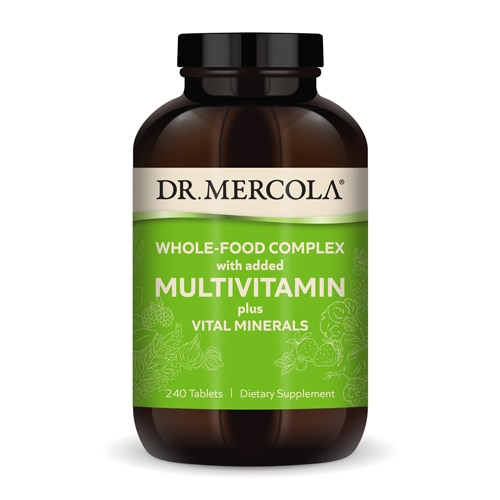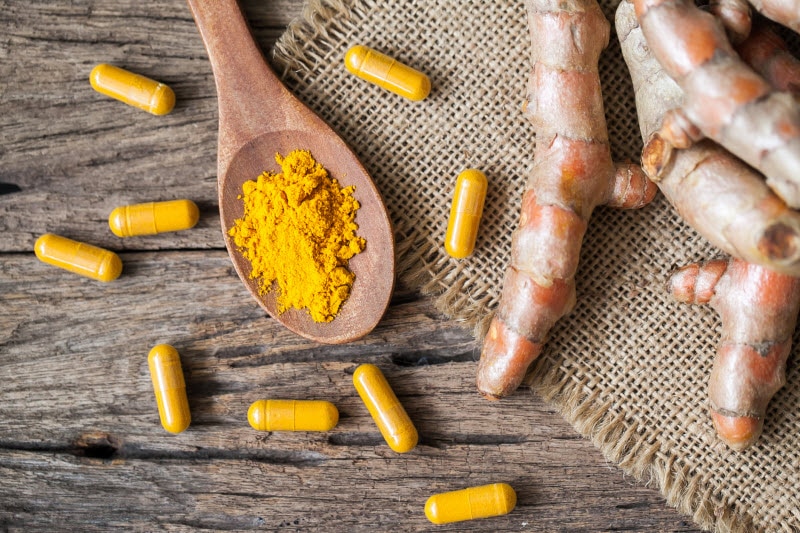Dr. Mercola Whole Food Multivitamin Plus Description
-
Premium Supplements
-
Plus Vital Minerals
-
Contains Whole Food Concentrates, Vitamins, Minerals and Other Nutrients
-
Soy Free
-
Gluten Free
Whole -Foods Multivitamin Plus provides you with high-potency amounts of an exclusive antioxidant formula that includes:
» Natural beta-carotene - healthy vision and immune system support
» Vitamin C - promotes tissue growth and repair, and healthy gums
» Vitamin E - helps support your muscular system
» Selenium - bolsters your healthy immune system
» L-cysteine - supports your immune and respiratory systems
» Lutein - helps promote your healthy vision
» Lycopene - supports your immune system
» Red wine proanthocyanidins - provides you with cardiovascular system support
» And select extracts and powders from over 25 fruits, vegetables and herbs
*These statements have not been evaluated by the Food and Drug Administration. This product is not intended to diagnose, treat, cure, or prevent any disease.
| Amount Per Serving | % Daily Value | |
| Calories | 15 | |
| Total Carbohydrate | 3 g | 1% |
| Vitamin A (as Beta Carotene) | 1500 mcg | 167% |
| Vitamin C (from Niacinamide, Ascorbate, Magnesium and Calcium Ascorbate, Ascorbyl Palmitate) | 500 mg | 556% |
| Vitamin D3 (as Cholecalciferol) | 125 mcg (5000 IU) | 625% |
| Vitamin E [as d-Alpha Tocopheryl Succinate (from Sunflower Oil)] | 134 mg | 250% |
| Thiamin (Vitamin B2) (as Thiamin HCl) | 3 mg | 250% |
| Riboflavin (Vitamin B2) (as Riboflavin-5-Phosphate) | 3.4 mg | 262% |
| Niacin (as Niacinamide Ascorbate) | 40 mg | 250% |
| Vitamin B6 (as Pyridoxal-5-Phosphate) | 4 mg | 235% |
| Folate (as Metafolin®) (from (6S)-5-Methyltetrahydrofolic Acid [Calcium Salt]) (Folic Acid equivalent 400 mcg) | 665 mcg DFE | 166% |
| Vitamin B12 (as Methylcobalamin) | 100 mcg | 4,167% |
| Biotin | 900 mcg | 3,000% |
| Pantothenic Acid (from Calcium Pantothenate) | 30 mg | 600% |
| Choline (from Choline Bitartrate and Dihydrogen Citrate) | 60 mg | 11% |
| Calcium (from Calcium Citrate-Malate and Ascorbate) | 250 mg | 19% |
| Iodine (from Kelp) | 200 mcg | 133% |
| Magnesium (from Magnesium Amino Acid Chelate Complex and Ascorbate) | 500 mg | 119% |
| Zinc (from Zinc Amino Acid Chelate) | 15 mg | 136% |
| Selenium (from Selenium Amino Acid Chelate Complex) | 200 mcg | 364% |
| Copper (from Copper Amino Acid Chelate) | 0.05 mg | 6% |
| Manganese (from Manganese Amino Acid Chelate) | 2 mg | 87% |
| Chromium (from Chromium Amino Acid Chelate) | 200 mcg | 571% |
| Molybdenum (from Molybdenum Amino Acid Chelate Complex) | 100 mcg | 222% |
| Potassium (from Potassium Krebs Chelate and Amino Acid Chelate Complex) | 100 mg | 2% |
| Lutein [from Marigold (Tagetes erecta) (Flower)] | 6 mg | * |
| Lycopene [from Tomato (fruit)] | 6 mg | * |
| Zeaxanthin [from Marigold (Tagetes erecta (flower)] | 1 mg | * |
| Inositol | 100 mg | * |
| Trace Elements (from Red Seaweed) | 100 mcg | * |
| Strontium (from Strontium Citrate) | 297 mg | * |
| Silica | 100 mg | * |
| PABA (Para-Aminobenzoic Acd) | 50 mg | * |
| Boron (from Boron Amino Acid Chelate Complex) | 1.5 mg | * |
| Vanadium (from Vanadium Amino Acid Chelate Complex) | 50 mg | * |
| L-Cysteine and N-Acetyl L-Cysteine | 150 mg | * |
| Betaine (from Betaine HCl) | 114 mg | * |
| Bromelain | 50 mg | * |
| Glutamic Acid | 20 mg | * |
| Rose Hips | 100 mg | * |
| Lemon Bioflavonoid Complex | 100 mg | * |
| Grape Seed Extract and Pine Bark Extract Blend (Contains Proanthocyanidins) | 50 mg | * |
| Hesperidin | 35 mg | * |
| Rutin | 25 mg | * |
| Dr. Mercola Fruit and Vegetable Blend [Kale (Leaf), Spinach (Leaf, Stem), Carrot (Root), Radish (Root), Celery (Leaf, Stalk), Apricot (Fruit), Blackberry (Fruit), Cranberry (Fruit), Grape Skin Extract] | 692 mg | * |
| Blueberry (Fruit) | 100 mg | * |
| Garlic Extract (Bulb) | 100 mg | * |
| Broccoli (Whole Plant) | 100 mg | * |
| Cauliflower (Whole Plant) | 100 mg | * |
| Chlorella (Chlorella vulgaris) | 100 mg | * |
| Papain | 100 mg | * |
| Beet Extract (Root) | 50 mg | * |
| Apple Pectin | 50 mg | * |
If you are pregnant, taking medication or have a medical condition, consult your physician before taking this product.




